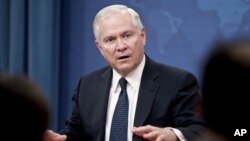As he flew toward Peru at the start of a swing through South America and the Caribbean Tuesday, U.S. Defense Secretary Robert Gates said the Obama Administration is paying attention to the region, even as it focuses on the wars in Afghanistan and Iraq. VOA's Al Pessin is traveling with the secretary, and filed this report from on board his aircraft on the way to Peru.
Secretary Gates' visit follows trips by President Obama and Secretary of State Hillary Clinton, all within the first 15 months of the administration's tenure. During the flight, Gates defended the administration against some critics, who say it has not paid enough attention to the region.
"I think that there's actually been a fair amount of attention and priority given to it. And just like the president finding the 30 million in funds last year, very early in the administration. So I think we've been attentive," he said.
Secretary Gates said the administration later found an additional $15 million for Latin America, a significant amount of it for security cooperation.
Gates visited Peru just 2.5 years ago, as former President George W. Bush's defense secretary. He explained why he believes it is worth going back now. "Peru has been a constructive influence, in our view, in South America, in terms of trying to counter some of the propaganda and other things from Venezuela, and in terms of representing what we're trying to do in a straightforward manner. They have their own interests. But the reality is Peru has been a good friend to the United States, and that's a good reason to go," he said.
That relationship is particularly useful in the face of anti-U.S. rhetoric coming out of Venezuela, which has been improving its relationship with Iran. But Secretary Gates dismissed the Venezuelan and Iranian rhetoric, saying both countries are trying to divert attention from their significant domestic problems, particularly their weak economies.
"To a certain extent I think there is an element of distracting their own populations from the difficulties that they have by strutting around trying to strut around the world stage," he said.
Gates said Venezuela is not a military threat to the United States, and he has not seen much evidence of Iran trying to develop terrorist proxies in the region.
Asked whether the United States wants to establish a military base in Peru to replace one it lost in Ecuador, Gates only said there are no plans to sign any agreements during this visit.
Still, Pentagon officials call Peru a strategic ally on several issues, and say a major focus of the visit will be on increasing cooperation in the fight against illegal drug trafficking. But they also note that a remnant of the Shining Path guerrilla movement, or Sendero Luminoso, has carried out some attacks recently, and Peru's defense minister cited it as a threat during a recent visit to Washington.
Still, the former U.S. Assistant Secretary of State for Western Hemisphere Affairs, Roger Noriega, who is now at the American Enterprise Institute research organization, says Peru likely wants to handle that threat on its own, as it has in the past.
"I think the U.S. did not really play a significant role in the initial struggle against terrorism under Sendero Luminoso. We really were not welcome to play a role. And I imagine that most Peruvians will want Peru to tend to that threat on its own and not really involve the United States," he said.
Later in the week, Secretary Gates will travel to Colombia, which he also visited during his last South America trip. There, the United States has spent billions of dollars in recent years to help the Colombian government fight the FARC guerrillas, an effort that has brought considerable stability to the country. Gates credits President Alvaro Uribe with much of that success.
"Uribe in my view is a great hero, and has been an enormously successful President of Colombia. And the key also will be to consolidate the achievements and particularly our partnership on an enduring basis so that this relationship continues to thrive and grow after President Uribe leaves office," he said.
Colombia has presidential elections next month, and President Uribe's term ends in August. the Brookings Institution, senior fellow and former Colombian government minister Mauricio Cardenas says another Gates visit is a good thing, both because of the significant U.S.-Colombian military relationship that exists now, and for the future under new Colombian leadership.
"It makes a lot of sense for the secretary to go to Colombia, and also to express a vision of what's going to happen in the next few years in terms of the collaboration, the cooperation, of the U.S. in those areas, in the security areas," he said.
Cardenas says there is no significant disagreement among Colombian presidential candidates about the need to maintain a strong security relationship with the United States.
Secretary Gates said under President Uribe's leadership, Colombia is beginning to share what it knows about fighting insurgents - both militarily and through development and good governance - with other countries in the region, and even with Afghanistan. U.S. officials say the secretary will make clear to President Uribe that the United States expects continuing military efforts against the guerrillas to be conducted with proper respect for Human Rights.
On this trip, Gates will also visit Barbados for a Caribbean regional security meeting expected to focus on fighting illegal drug trafficking and other transnational crimes.




